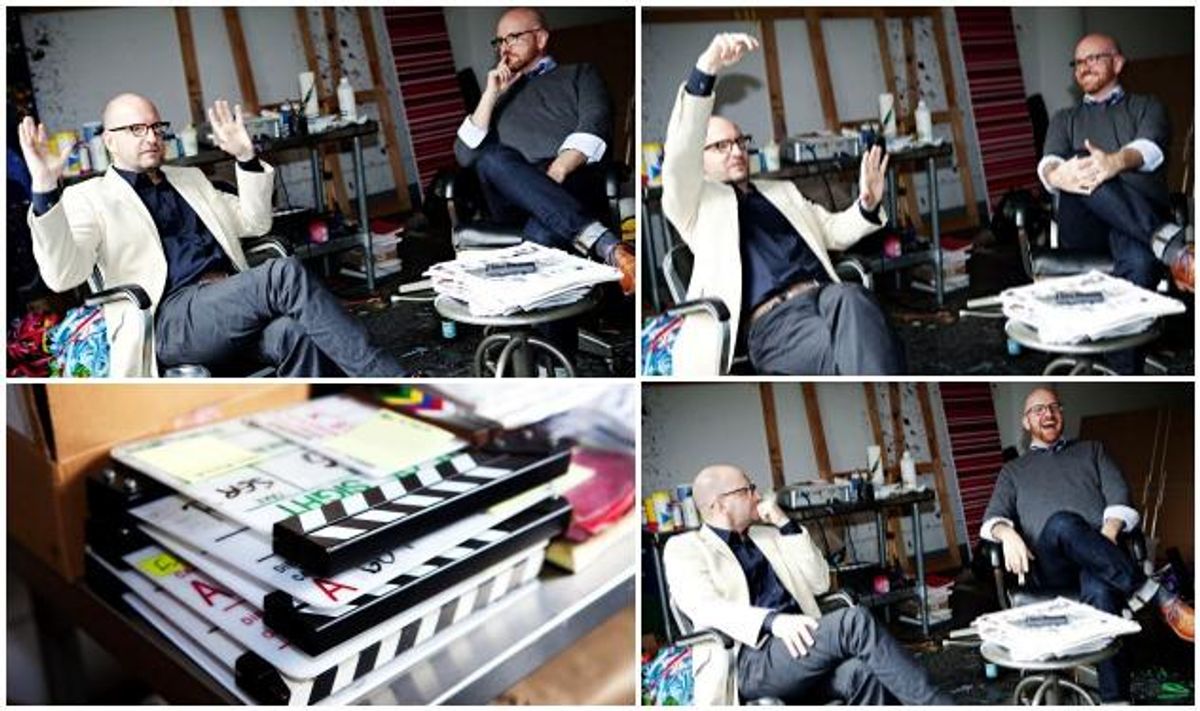Photography by Jessica Craig-Martin
Director Steven Soderbergh has made movies about crime capers, sexual inhibitions, and revolutionaries. Along the way, he won an Academy Award for Traffic the same year he was also nominated for Erin Brockovich, the only director in the awards' history to be nominated for two films simultaneously.
Last year, he had an unexpected hit about male strippers, Magic Mike, starring Channing Tatum, and then announced that he would retire from filmmaking to focus on painting. The last film he shot was Behind the Candelabra, a passionate exploration of the relationship between pianist Liberace--known to his friends as "Lee"--and Scott Thorson, played by Oscar winners Michael Douglas and Matt Damon (it premieres on HBO May 26).
"I'm not a snob," says Soderbergh. "I like a lot of different kinds of movies--that's why I've made a lot of different kinds of movies. And in some ways, Candelabra was an opportunity to make use of all those hours spent immersed in an attitude and aesthetic that I've wanted to mix up and add my own thing to."
Steven's younger brother, Charley, is gay and has a successful hair salon in Atlanta. We invited the two brothers to sit down for a free-wheeling conversation about childhood, power dynamics in relationships, and the meaning of Dr. Terwilliker.
Charley Soderbergh: Our relationship growing up was very typical of younger and older brother. There wasn't really a dramatic moment around my sexuality--I think my family knew well before I did. As Steven told me, "We were all just waiting for you to come to what we already knew."
Steven Soderbergh: I called him Charlotte.
CS: That's true, he did call me Charlotte.
SS: It was clear immediately that he was different than I was, and a five-year gap at that age is a big gap. We were sharing a room up until we moved to Baton Rouge. I don't think it was until I came back to Louisiana, until Charley got out of high school, that our relationship was sort of re-established.
CS: And during that time, Steven introduced me to two of the highest forms of gay culture: Sunset Boulevard and All About Eve. I believe they were on laserdisc?
Out: Was there a ritual of watching movies together in your family?
SS: Every Christmas we watched the same movie, The 5,000 Fingers of Dr. T, which came out in '53 and was a gigantic flop. It's a cult film. Dad would rent it and get a projector--that's an indication of how invested he was in movies.
CS: Mom and dad went to see it on their first date, or early on. It was a big deal in our family. The lyrics to all the words and the set decorations are all by Dr. Seuss. In the beginning of the film, this young boy is being forced to practice piano by his mother--I believe she's a widow--and he falls asleep and has a dream. And in his fantasy, Dr. Terwilliker--that's Dr. T--his piano instructor in real life, is rounding up all these children for one big performance of the greatest piece of music ever produced. He stands up there in this beautiful violet robe. And I'm realizing, it's very...
Out: Liberace?
SS: He's played by Hans Conried, who is unbelievably hilarious. It's really smart and beautiful and hallucinatory. When you watch it now, you think, This was in a theater 60 years ago?It's really, really stunning.
CS: The two main actors, Peter Lind Hayes and Mary Healy, were always to us a slight representation of our parents up onscreen.
SS: When they were younger they looked similar.
CS: My mom, at 83, is still referencing the film. In the fantasy, Dr. Terwilliker has designs on the mother and puts her under his spell. At night, he puts her in the "Lock Me Tight," and he closes these ornate gates with a padlock. She goes dormant behind them and sits at her dressing table in her chiffon. To this day, when I go visit my mother in Florida and it's time to go to bed, I say, "OK, time for me to go next door and put you in your Lock Me Tight," and she follows. It's part of our blood, I think.
Out:Behind the Candelabra is set in the '80s, which is when Steven was living in Louisiana and his first big movie, sex, lies, and videotape, came out. What was that time like for you, Charley?
CS: When sex, lies came out, I was in school to do hair and makeup. Steven later invited me to do a very small movie with him in '96, Gray's Anatomy, with Spalding Gray. I was Spalding's hair, makeup, wardrobe, confidant, lunch partner, chauffeur, dream interpreter, everything. I really enjoyed the experience, but I realized the set-up of making a movie, of how you have to be available at all times, didn't gel with my work.
SS: I think Charley found the perfect thing to do. There's a technical skill that he has--which is the hair--and a social skill. I knew Spalding would like him, and they would get along. He adored Charley. But it's true: There's an enormous amount of downtime, and it takes a certain kind of personality to thrive on that.
CS: There was a scene that they were trying to light in a specific way and it took five hours. And Spalding was falling over in a chair, going, "How much longer?" And I thought, Yeah, how much longer to light a scene?It gave me a new appreciation for what Steven does and how calm and how patient he is. When I went to see him on the set of Candelabra, he was just very focused and very calm. And I was like, "OK, what are we going to do next?"
Out: You got to visit the set?
CS: Yeah, it being his last film, it felt like the right thing to do. I'm really sorry I missed Debbie Reynolds.
SS: She's a trip. Debbie knew Frances Liberace really well, so she had the voice down. She and Lee were in Vegas a lot together, performing, and they would go out afterward. She knew Scott Thorson, so she was really helpful in describing the relationship with his mother. Talking about that era, there's such an undercurrent of melancholy about the whole movie, because of what we know was going on with AIDS. The fact is, if this were happening now, they wouldn't be having a lot of these issues. They could be Elton John; they could be married. Nobody would care.

Matt Damon and Michael Douglas in "Behind the Candelabra" / Photo courtesy of HBO
CS: Their relationship in the movie has the dynamic of any relationship. You could have taken that dialogue and plugged it in anywhere. After seeing the movie a couple more times, you pay more and more attention to their relationship, instead of, "Wow, it's Liberace." Or "It's Michael Douglas and Matt [Damon] making out." You're actually in their story, rather than getting goose bumps because they're in a hot tub together.
SS: Halfway through the movie, I sort of forget it's two guys, and I'm just in the relationship. I wanted the movie to be very generous to Lee and Scott. I took them seriously, and I took the relationship seriously. It was a real relationship that was derailed because of some very odd external forces, some of them social and some professional. But there was an extended period where they were fat and happy. And if Lee hadn't worked in a business where he thought that was a problem, or being gay was a problem, I think there would have been a very different outcome. It's compelling to watch the two of them together. It's sort of a Thelma & Louise thing--they decide to jump off the cliff together.
Out: One of the most distinctive scenes, perhaps because it's so rare to see it portrayed honestly in a movie, was the argument they have about who will be a top or a bottom.
SS: Whenever you're in a sexual relationship that lasts long enough, at some point someone is going to hit on something that they want to do and the other person doesn't want to do. That's unfortunate, because it's really hard to put that genie back in the bottle once it's come out. If you're lucky there's some synchronicity that works out, and on the second Tuesday of every month, you get to do that. That's absolutely a conversation straight couples have all the time. It doesn't necessarily have the same significance, but oh, absolutely.
CS: I've been privy to conversations between a married male and female couple when one of them wants to try it and the other is balking. And the physical implications are the first thing they're afraid of, and the social implications are the second thing. So we have two layers of fear. And I just stand there with a smile on my face, thinking, I can't wait to see how you work this out.
SS: It's one of my favorite scenes in the film because it is so blunt and so funny. "Why am I the Lucy in this relationship?"
CS: "Because I'm the bandleader and have the nightclub act."
SS:That's [screenwriter] Richard [LaGravenese] really hitting one out of the park. But it is fascinating, because you have Scott saying, "I'm OK with this, but I'm not OK with that." And Lee doesn't understand, because to him it seems like hypocrisy. I find that really true to life, in the sense that our feelings about sexuality aren't necessarily linear. Everybody's got some dot on a line with 10 points on it, and one is out of sync or in the wrong order. It's a very complex, powerful area of our lives, and it creates really fascinating emotions and delusions and omissions. And I thought, What an interesting conversation, especially if Lee's the one in the power position.
CS: Another part of that scene is, "I don't know how you can watch that stuff," referring to the porn on the TV. "How does he get it in his mouth?" I've talked to gay and straight couples who say, "I don't know why you watch that stuff, it makes me feel unloved." And the other one is like, "It's no big deal!"
SS: Yeah, porn's a big thing. Even to the point where I know couples who will watch it separately but they have no desire to watch it together.
CS: Or I know people who say, "When you watch porn, that's cheating on me."
SS: I was really interested in the sorts of power dynamics in this relationship. You've got wealth, a certain kind of fame, and that presents a certain power; and Scott's power is that he's young and beautiful and amenable. Where's this going?
Out: We see that with the plastic surgery Scott undergoes.
SS: I managed to get a hold of the depositions, some of which are in the film, and Scott and Lee tell completely different stories about how Scott's surgery came to be. So somebody is not telling the truth. We went with Scott's version because I love the image of Lee bringing the painting over and saying, "I want him to look like this."
CS: I thought about it as a gay man: What it would be like to step into Scott's shoes, someone who doesn't have much stability, and all of a sudden, you're sitting in this wealthy man's house, and he's just made a big meal for you. You're eating it, and he's looking at you adorably and goes, "Come here, you." I thought, Oh shit. Here we go--what a wild ride.I texted Steven after I saw it: "Thank you for making this, I just loved it." He called, and I told him, "Wow, what a great thing to go out on. It's fun, it's interesting, it's beautiful to look at."
Behind the Candelabra premieres May 26 at 9 p.m. EST on HBO.


























































































